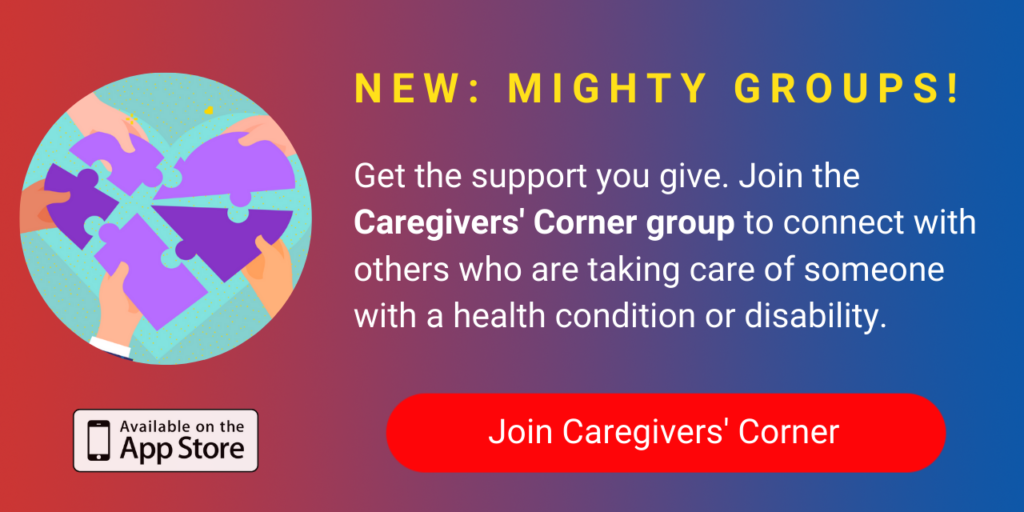My husband is the mainstay of my support system and, in large part, my caregiver. I cannot count the things he has done for me and does for me every day. We’ve been married for over 35 years and during that time he has helped me through daily life, major depression, anxiety attacks, loneliness, irrational thoughts, school, therapy. He makes sure I practice self-care and cares for me as needed.
• The Mighty’s Caregiving Toolkit
Recently, though, he needed my help and care.
The other day, he experienced distressing eye-related symptoms – a large “floater” (or dark spot) in his vision and unexpected flashes of light. What could I do about it? First, I answered his request to get a flashlight and look in his eye, but I saw nothing.
Next, I arranged an appointment for him at our eye doctor. Dan used to be terrible at admitting when he needed medical treatment, but since a heart scare, he’s been much more amenable to seeing a doctor. That particular evening, he was scared and cranky, and made up excuses. He left his phone in the car. That’s OK. I had mine right there. He didn’t know the number. That’s OK. I have it programmed into my phone. I waited on hold. “Forget it,” he said. “Never mind,” I replied. “I’ve got nothing else to do.” He said he didn’t see the floater any more. I pointed out that his eyes were closed.
I got through to the doctor and made him an appointment for the next day.
Naturally, I drove him to the appointment, as they would have to dilate his eyes. Then, afterward, I drove him on several other errands (including an appointment with a different doctor) and made sure he ate lunch. I canceled one of the errands and put off others when I saw how tired and nervous he was getting. I took him home and tucked him in bed. (The floater turned out to be nothing truly alarming, just an effect of his aging eyes. He named it, “Freddie the Free-Floater.”)
Dan has done almost exactly the same for me, many times. I could usually make my own appointments, but he encouraged me to do so. He has driven me to appointments countless times. He makes sure I eat. When I run out of spoons, he cancels or postpones errands, or even runs them for me. He reminds me when I need to have a lie-down or to sleep or to shower.
It was unusual for me to be the caregiver in this situation, and at times difficult, but I didn’t begrudge it. How could I possibly?
Of course, later in the day, I had a crisis and a mini-meltdown of my own, and there was Dan, ready to be with me, talk me through it, and make sure I didn’t skip a meal.
I know this is what marriage is supposed to be – partners helping each other through their individual and mutual times of difficulty. I also know that mental illness can put a terrible strain on a relationship. I admit that I am very needy at times, and was even more so at other times in my life.
But this time, I got to be the strong one and take care of his needs before my own. And I was pleased and proud to be able to do that.
Often, there’s little enough that I can do for him, except offer him encouragement and remind him that I love him and appreciate him and all he does for me. If he asks for something he needs, I try to make sure he gets it (except for the $900 wood chipper, I mean). And I do what I can that benefits both of us — working to bring in money, paying the bills, doing computer research, handling phone calls, reminding him of appointments when I can — mostly stuff that involves computers and phones and record-keeping and occasionally knowing where missing stuff is.
And reassuring him when he gets trapped in the depression that he also struggles with that I love him and that he is strong and good, and that he needs to take care of himself, and that if he can’t, I will try and do my best.
Photo by Renate Vanaga on Unsplash


